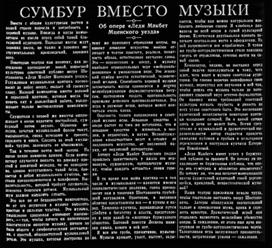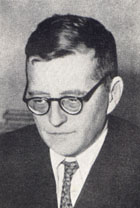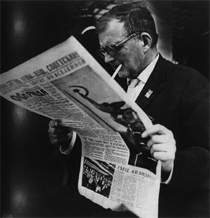The Harrowing Beauty of Lady Macbeth of Mtsensk
 Last Sunday, the Kirov presented Dmitri Shostakovich’s opera Lady Macbeth of Mtsensk under the baton of Valery Gergiev: A single concert performance as their parting gift, concluding their annual residency at the Kennedy Center. Shostakovich’s more-or-less only opera from 1930/32 is a work of a very particular attraction. From the first moment, the listener is shocked by a deliberately dissonant, confused stream of sound. Fragments of melody appear only to disappear in confused screaming.
Last Sunday, the Kirov presented Dmitri Shostakovich’s opera Lady Macbeth of Mtsensk under the baton of Valery Gergiev: A single concert performance as their parting gift, concluding their annual residency at the Kennedy Center. Shostakovich’s more-or-less only opera from 1930/32 is a work of a very particular attraction. From the first moment, the listener is shocked by a deliberately dissonant, confused stream of sound. Fragments of melody appear only to disappear in confused screaming.Maybe so. History judges the review from which these last two sentences are lifted (inspired, if not written by Josef Stalin) as harshly as perhaps only Hanslick’s verdict about Tchaikovsky’s Violin Concerto (“Music that stinks to the ear”). True, the review included harsher language, accused Lady Macbeth of being a “crude, primitive and vulgar” composition. If the above is actually not so far off the mark, the latter judgment is woefully inept. Still, the arrogance of the critic who can call Lady Macbeth of Mtsensk an “impossibly beautiful” opera (without any qualification or explanation) probably exceeds the narrow mindedness of the (ideological) derision the work received at the hands of the party-hack who got to work on that Pravda review in January of 1936.
 The truth is that Shostakovich’s masterpiece is not much less difficult to find beautiful than Alban Berg’s Violin Concerto or Prokofiev’s Third Symphony or Benjamin Britten’s Peter Grimes. All these works, to me and many dedicated classical music lovers, are of course considered “impossibly beautiful”, but this is a distinct minority (or more honestly still: elite) opinion. No one likes to call him or herself part of the “elite” – certainly not in this country. And surely not when it comes to classical music, which the elite thinks already suffers from an elitist image. It is precisely that irony that makes me spend time on the issue of calling Lady Macbeth of Mtsensk an “impossibly beautiful opera”: Because it displays the attitude of utter elitism without having the guts to admit it.
The truth is that Shostakovich’s masterpiece is not much less difficult to find beautiful than Alban Berg’s Violin Concerto or Prokofiev’s Third Symphony or Benjamin Britten’s Peter Grimes. All these works, to me and many dedicated classical music lovers, are of course considered “impossibly beautiful”, but this is a distinct minority (or more honestly still: elite) opinion. No one likes to call him or herself part of the “elite” – certainly not in this country. And surely not when it comes to classical music, which the elite thinks already suffers from an elitist image. It is precisely that irony that makes me spend time on the issue of calling Lady Macbeth of Mtsensk an “impossibly beautiful opera”: Because it displays the attitude of utter elitism without having the guts to admit it.One look around the woefully empty Concert Hall would have sufficed in making that point. Many of those in attendance had regretfully wondered why it was the most interesting of the three Kirov presentations (Rossini’s Il Viaggio a Reims and Verdi’s Falstaff had been shown in staged performances) was relegated to a ‘mere’ concert performance. Because the wider public has an astounding, regrettably pronounced ability to resist such ‘impossibly beautiful music’. That's why.
This is a shame, because Lady Macbeth of Mtsensk actually is an astounding opera, a masterpiece as Shostakovich probably never wrote again. An early pinnacle after which few uncontroversially great works followed. I still think that “beautiful” is the wrong word for this work for most people, but this opera is many things: rousing, arousing, marching, dancing, tender, loving, abrasive, ironic, sardonic, terrifying, ripping, smashing. And, yes, occasionally plain beautiful. You will find touches of Berg, touches of Mahler, touches of Schoenberg in this work; others will hear Richard Strauss or even the lightness of the ‘lesser’ Strauss’ waltzes. After the official criticism DSCH never composed quite in the same style. Lamentable, because in Lady Macbeth of Mtsensk he created a greater variety of tone, a greater sophistication, warmth, and compositional carefreeness than in any of his subsequent orchestral works.
 Robert R. Reilly reviewed this opera at Covent Garden for Ionarts and was impressed. As I, he wondered how it would work in concert performance. Should anyone have had a doubt: It works marvelously! The operatic/cinematic musical language (second only to Bartók’s Bluebeard), almost graphic in its descriptions, is only enhanced by the concert-performance. As with the NSO’s Salome in late January, the orchestral details were more audible by hearing the orchestra from above the pit. A slew of new impressions, allusions, and subtleties suddenly indulged the ears. More than could possibly be all absorbed in one sitting. The impeccably human humor, the superb arch of the story (the libretto was written by Alexander Preis together with Shostakovich, based on a short story by Nikolai Leskov), the breathless storytelling within this opera all contributed to its success on the concert stage and made its three hours fly by.
Robert R. Reilly reviewed this opera at Covent Garden for Ionarts and was impressed. As I, he wondered how it would work in concert performance. Should anyone have had a doubt: It works marvelously! The operatic/cinematic musical language (second only to Bartók’s Bluebeard), almost graphic in its descriptions, is only enhanced by the concert-performance. As with the NSO’s Salome in late January, the orchestral details were more audible by hearing the orchestra from above the pit. A slew of new impressions, allusions, and subtleties suddenly indulged the ears. More than could possibly be all absorbed in one sitting. The impeccably human humor, the superb arch of the story (the libretto was written by Alexander Preis together with Shostakovich, based on a short story by Nikolai Leskov), the breathless storytelling within this opera all contributed to its success on the concert stage and made its three hours fly by. D.Shostakovich, Lady Macbeth, M.Jansons / RCO / E.Westbroek et al. Dir. Martin Kušej Opus Arte Bluray      D.Shostakovich, Lady Macbeth, M.Rostropovich, G.Vishnevskaya... EMI     |
Shostakovich makes great demands on the singers and on no one more than the title role. Taken by Larisa Gogolevskaya on Sunday, this is a role in which you can either only fail, since it is nearly impossible to meet every requirement (dynamic range, the extreme range of register, beauty of tone throughout, vocal acting)… or only win, because no one could possibly expect more than a maximum of effort and dedication. Mme. Gogolevskaya could not be faulted for lack of the latter. Occasional difficulties were largely minor and she dug into her part with all her heart and soul. Hers is not the finest or most elegant of voices, but then Katerina Izmailova is not an elegant or ‘fine’ woman. She is a rather earthy, practical woman; illiterate but savvy and not shy of committing the occasional murder to further her freedom.
Daniel Ginsberg, Kirov's Power Unleashed In Shostakovich Work (Washington Post, February 6) Charles T. Downey, Lady Macbeth of Mtsensk, Kirov Opera (DCist, February 6) T. L. Ponick, 'Macbeth' Russian style (Washington Times, February 6) |























































No comments:
Post a Comment